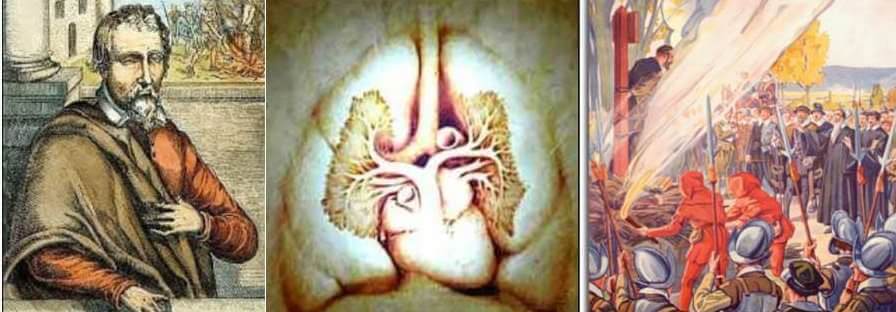
Michael Servetus is remembered for being burned at the stake for heresy and for making important observations on the pulmonary circulation. In his Christianismi Restitutio, a theological treatise that touched on medicine, he postulated that blood in the body was divided into different segments (which he called God-ordained spirits): one in the arteries, one in the liver and veins, and one in the brain and nerves. Unable in his dissections to find the microscopic pores through which Galen thought that blood passed from the right side of the heart to the left, he was on the other hand impressed by the size of the pulmonary veins (which he argued must be for some reason) and by the changed color of the blood coming from the lungs. He concluded in his treatise that what he called the “vital spirit” was produced inside the lungs by the mixing of blood and inhaled air, and then transferred to the left ventricle “in a brilliant way, by following a long circuit through the lungs.”
Born in Spain ca. 1510, Servetus was a prodigy and polymath who spent most of his life in France. He learned Latin, Greek, and Hebrew at an early age; and later became versed in astronomy, mathematics, meteorology, astronomy, geography, pharmacology, jurisprudence, and poetry. At age fifteen he worked as secretary to the confessor of Emperor Charles V and attended his coronation at Bologna (1530). He studied medicine in Paris (1536), obtained his doctorate in Montpelier (1539), then set up a medical practice in Vienne, where he became physician to the archbishop and to the lieutenant governor of the Dauphiné. At various times he wrote on syrups, syphilis, the eye, ear, and nerves.
Servetus held strong views on the nature of the Divine Trinity, on whether this comprises three separate gods or whether in a mystery incomprehensible to our feeble understanding it consists of three co-equal ones. This issue, which rarely troubles the modern mind, had been a cause of bloody battles since the fifth century and continued to his time. Servetus believed that Christ did not become the Son of God until the moment when he was born, sharply disagreeing with John Calvin, the despotic theocratic ruler of Geneva. When Servetus incautiously stopped in Geneva on his way to Italy, he was arrested, tried for heresy, and burned at the stake with his books (1553). Three copies only survived of his Restitutio to inform posterity about his observations on the pulmonary circulation. In this Servetus joins his contemporaries Realdo Colombo and Andre Cesalpino in paving the way for the later recognition that the heart was responsible for circulating the blood through the entire body, an observation made as early as 1236 by the Egyptian Ibn-Nafis, and then again by William Harvey in 1616.

Leave a Reply